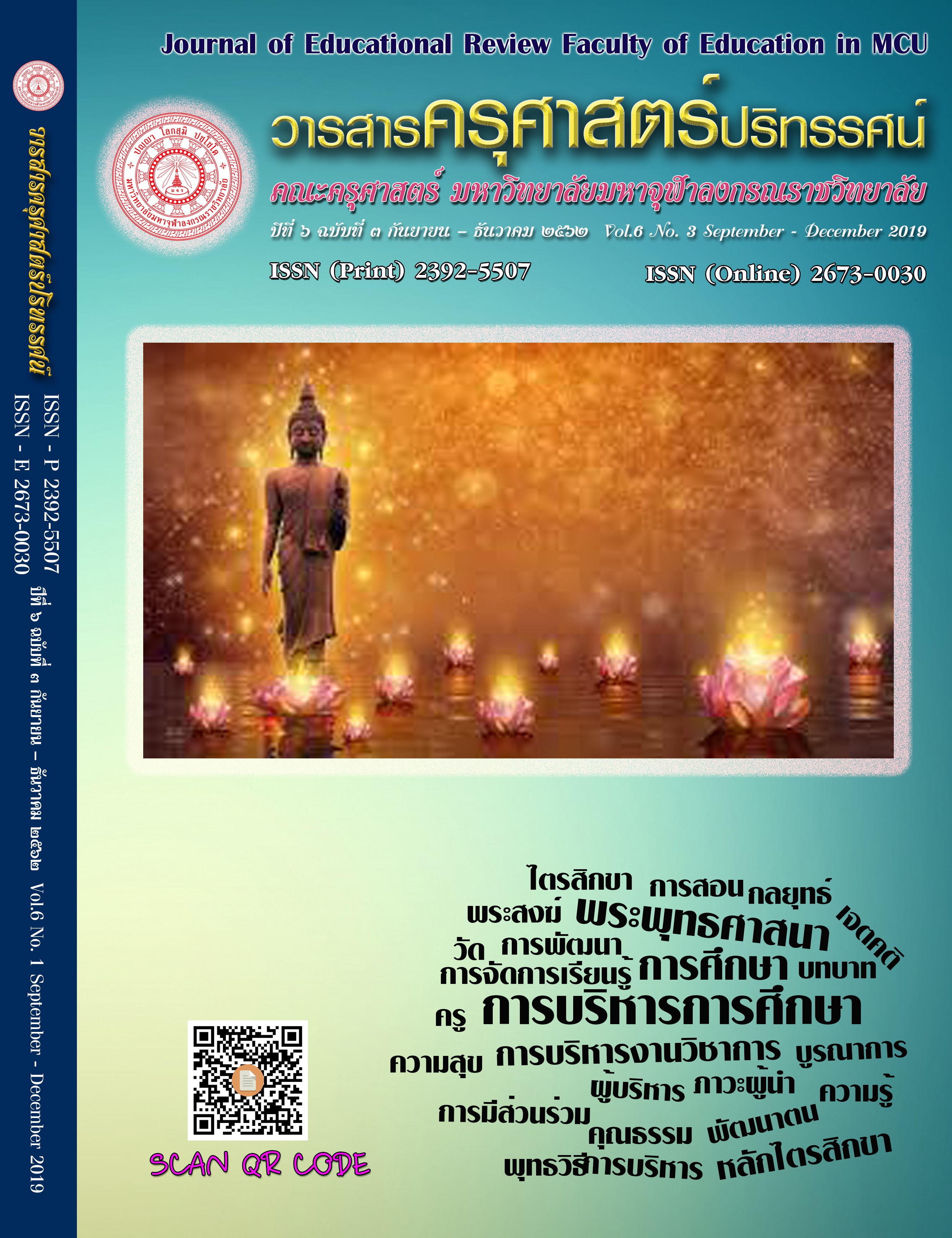THE DEVERLOPMENT OF EMPOWERMENT MODEL FOR ENHANCR MEASURMENT AND EVALUADE COMPETENCIES OF TEACHER IN EXPANSION SHOOL UNDER PRIMARY EDUCATION AREA OFFICES
Main Article Content
Abstract
The purposes of this researcher were arranged to develop the models of the empowerment for more capacities of educational measurement and evaluation of opportunity expansion school teachers belonging to Primary Educational Service Area Office and to study The performances according to the developed empowerment for more capacities of educational measurement and evaluation models.
The findings of the research were the developed empowerment including into 3 parts in the following issues (1) The leading into the training process. (2) The training included the preparing, the content presentation, the practice, the inspiration and idea expansion and (3) The performance of the empowerment following. There were 6 elements included (1) Concepts and basic principles (2) Purposes (3) The expected results (4) The contents of the empowerment evaluation activities (5) The process of the arranged practice activities for the empowerment evaluation and (6) The evaluation. The teachers got the higher average scores of the educational measurement and evaluation capacity after the practice than before the practice at the 0.01 level of significant. The teachers got higher scores of the ability in the empowerment for their work after the practice than before the practice at the 0.01 level of significant. The empowerment for more capacities of educational measurement and evaluation models were useful, possible, correct and suitable. School directors, teachers, supervisors and accomplices were satisfied the empowerment for more capacities of educational measurement and evaluation in high level.
Article Details
ทัศนะและความคิดเห็นที่ปรากฏในบทความในวารสารฉบับนี้ถือเป็นความรับผิดชอบของผู้เขียนบทความนั้นเพียงผู้เดียว และไม่ถือเป็นทัศนะและความรับผิดชอบของกองบรรณาธิการ
กองบรรณาธิการขอสงวนสิทธิ์ในการคัดเลือกบทความลงตีพิมพ์และจะแจ้งให้เจ้าของบทความทราบหลังจากผู้ประเมินบทความตรวจอ่านบทความแล้ว
ต้นฉบับที่ได้รับการตีพิมพ์ในวารสารครุศาสตร์ปริทรรศน์ คณะครุศาสตร์ มหาวิทยาลัยมหาจุฬาลงกรณราชวิทยาลัย ถือเป็นกรรมสิทธิ์ของคณะครุศาสตร์ มหาวิทยาลัยมหาจุฬาลงกรณราชวิทยาลัย ห้ามนำข้อความทั้งหมดหรือบางส่วนไปพิมพ์ซ้ำ เว้นเสียแต่ว่าจะได้รับอนุญาตจากมหาวิทยาลัยฯ เป็นลายลักษณ์อักษร
References
กฤติยา วงศ์ก้อม. (2547). รูปแบบการพัฒนาครูด้านการประเมินการเรียนรู้ตามแนวคิดการ ประเมินแบบเสริมพลังอํานาจที่สอดคล้องกับพระราชบัญญัติการศึกษาแห่งชาติ พุทธศักราช 2542. วิทยานิพนธ์ครุศาสตรดุษฎีบัณฑิต สาขาวิชาการวัดและประเมินผลการศึกษา. บัณฑิตวิทยาลัย :จุฬาลงกรณ์มหาวิทยาลัย.
กฤษณา คิดดี. (2547). การพัฒนารูปแบบประเมินการจัดการเรียนการสอนที่เน้นผู้เรียนเป็นสําคัญ. วิทยานิพนธ์ครุศาสตรดุษฎีบัณฑิต สาขาวิชาการวัดและประเมินผลการศึกษา. บัณฑิตวิทยาลัย :จุฬาลงกรณ์มหาวิทยาลัย.
คณิต เขียววิชัย. (2551). การเสริมสร้างพลังอํานาจให้กับคณบดีคณะครุศาสตร์ศึกษาศาสตร์. วิทยานิพนธ์ครุศาสตรดุษฎีบัณฑิต สาขาวิชาอุดมศึกษา. บัณฑิตวิทยาลัย :จุฬาลงกรณ์มหาวิทยาลัย.
จารุวรรณ ศิลปรัตน์. (2548). การพัฒนารูปแบบเสริมพลังการทํางานเพื่อพัฒนาศักยภาพการเป็น นักวิจัยของครูอนุบาล. วิทยานิพนธ์การศึกษาดุษฎีบัณฑิต สาขาวิชาการศึกษาปฐมวัย. บัณฑิตวิทยาลัย : มหาวิทยาลัยศรีนครินทรวิโรฒ.
จินตนา พรสัมฤทธิ์โชค. (2542). พลังอํานาจในการปฏิบัติงานและรูปแบบการตันสินใจของผู้บริหาร วิทยาลัยพยาบาลกระทรวงสาธารณสุข. วิทยานิพนธ์การศึกษามหาบัณฑิต (พยาบาลศาสตร์). บัณฑิตวิทยาลัย : มหาวิทยาลัยเชียงใหม่.
ชนม์ชกรณ์ วรอินทร์. (2549). การพัฒนารูปแบบการประกันคุณภาพภายในสถานศึกษาระดับการศึกษาขั้นพื้นฐาน : การประเมินแบบเสริมพลัง. วิทยานิพนธ์ครุศาสตรดุษฎีบัณฑิต สาขาวิชาการทดสอบและวัดผลการศึกษา. บัณฑิตวิทยาลัย : มหาวิทยาลัยศรีนครินทรวิโรฒ.
Alkin, M.C. (1969). EValuation Theory Development. Evaluation Comment. 2(1): 2 - 9.
Almaseb, H.; & Julia,M. (2007). Kuwaiti Bedouin Muslim women achieving control over their lives : Factors supporting empowerment. Social Development. 29, 80 – 99.
Ashworth, A.; & Harvey, R.C. (1994). Assessing Quality in Future and Higher Education. London: J. Kingsley Publishers.
Bandora, A. (1993). Perceived Self – efficacy in cognitive development and functioning. Educational Psychologist. 28(2): 117-148.
Bardo, J.W.; & Hartman, J.J. (1982). Urban Sociology : A Systematic Introduction. New York: Peacock.
Bertelsen,M.F.; & Holland, J. (2006). Empowerment in Practice from Analysis to Implemention. Washington DC. : The World Bank.
Block, P. (1987). The empowerment manager. San Fancisco, CA: Jossey Bass.
Boud,D., Cohen,R.; & Walker,D. (1993). Using Experience for Learning. Buckingham,VA: SRHE and Open University Press.
Breeding, R.R. (2008). Empowerment as a function of contextual self-understanding. Rehabilitation Counseling Bulletin. 51 (11): 96-106.
Bufored, J.A.; & Lindner, J.R. (2000). Human resource management in local government : Concepts and applications for students and practitioners. Cincinnati, OH: Southwestern.


